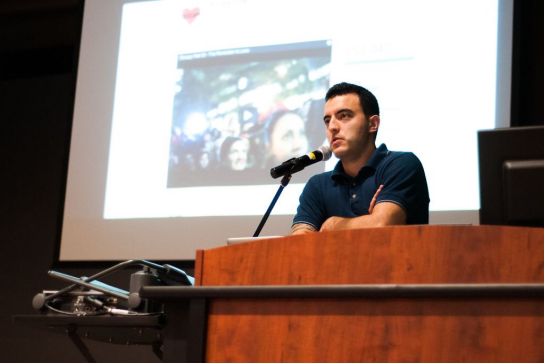Print Edition: January 30, 2013
Information gatekeepers. Broadcast models. Puppet rap videos. A guppy named Bruce.
Kai Nagata covered it all.
Roughly 50 students gathered in the B101 auditorium on January 28 as the former CTV Quebec City bureau chief turned freelance writer and videographer offered humour, wisdom and positivity as part of a look into the world of journalism.
At 24, Nagata rose to one of the most prestigious positions inside francophone journalism circles. Then he resigned. The discussion started with this story, but quickly moved to what he has been doing since and where journalism is headed.
Nagata began by describing the environment he worked in at CTV, affirming everyone’s beliefs about the inner workings of a major news broadcast station.
“Everything you’ve heard about vending machines full of beer and people smoking in their offices is totally true. This was like the most old school press gallery in the most old school version of journalism around,” he said.
The day he resigned and began a blog detailing his reasons, his phone was vibrating in circles with people inquiring into his mental health.
“It was crazy and it was exhilarating and it was really really weird. Then I started getting emails from MPs and party leaders and politicians and people were starting to offer me jobs and marriage proposals. It was totally out of control,” he explained.
The story of his resignation ballooned quickly and Nagata realized that his decision to leave big media spoke to those even outside the realm of journalism.
“I got notes from people in all kinds of weird industries that I had no contact with who felt that it spoke to them and their frustrations,” he explained. “I realized it was really more about them and their emotional state of mind, they didn’t know anything about me.”
He became interested in how ideas grow and move in non-traditional ways. This sparked the idea for an experiment.
Nagata went on to film the documentary Renaissance Man about a blind lute player who wanted to jump motorcycles in California. He and his team distributed the film without attaching their names to it to see if it would move based on the strength of the story.
 “If you don’t have a story, then it’s really hard. If you have a really slick marketing plan and awesome connections and you’re really good at the Twitters, that doesn’t really matter if you don’t have a story to tell,” Nagata explained, adding that if you can package and present your story to the people that want to see it, they become the engines of distribution.
“If you don’t have a story, then it’s really hard. If you have a really slick marketing plan and awesome connections and you’re really good at the Twitters, that doesn’t really matter if you don’t have a story to tell,” Nagata explained, adding that if you can package and present your story to the people that want to see it, they become the engines of distribution.
He went on to say that if the story reaches big enough groups of interested people, then it comes up against the gatekeepers of mainstream media.
“If you can get mainstream media journalists talking about your stuff, you’re right on the cusp of a breakthrough,” he said.
Though he was theoretically describing a method for pushing ideas around the internet, Nagata didn’t claim to have the fool-proof formula for going viral.
“It’s alchemy,” he said. “Once in a while if you’re trying to control these different factors, it’s going to work.”
Nagata showed several documentary trailers as part of his presentation, including one regarding climate change and one about the production of indie videogames. Industries all over, he said, are coming up against the limits of their growth.
To illustrate this point, he told the rapt audience a story about his childhood pet fish Bruce and how it taught him about the dangers of growth in a limited environment.
“I had this huge aquarium and I put him in this like 20 gallon aquarium in my room and he was the size of my thumbnail. As happens with guppies, they’ll just keep growing,” he said. “Then it turned out that Bruce was not a dude, so Bruce had 100 babies. Then things got really stressful for me because I was nine.”
Nagata described the massacre that occured in his fish tank.
“It was a battle royale guppy situation,” he explained animatedly. “I had to pull all these bodies out every day. It was sad. I was digging little holes in the yard.”
Eventually, when Bruce died, she had grown to the size of Nagata’s thumb. He realized that with the room and resources to grow, she thrived. On the other hand, once the tank became crowded with fish, none of them ever grew as large as Bruce.
“It made me realize in a closed system with limited resources, eventually there are limits to growth,” he concluded.
The story also operated as a metaphor for the situation that is unfolding in mainstream media, though Nagata never discounted what he learned from working in the system. At no point did he attempt to dissuade the aspiring journalists in the room from working towards a future at big telecom companies. Instead, he tried to shed light onto some of the underlying reasons for his resignation. During his time at CTV, Bell Media absorbed the network in order to continue to sustain itself.
“Those big telecom companies are dependent on growth. We’ve got three major telecom companies that own the TV stations and radio networks and the only way they can continue to grow at this point is by eating each other like the guppies,” he explained. “I found that a conflict of interest. As journalists we were supposed to think critically, we were supposed to question authority, we were supposed to question accepted logic.”
Instead they were serving as cheerleaders for the growth of the economy; their jobs depended on it. He described change inside the economy and within our society, but said the major media outlets aren’t capable of covering it. They are built on a hierarchal model that is only as strong as the person at the top.
“They’re collapsing at the same time and they don’t have the resources to send out and cover these major shifts in our society and our economy,” he said. Nagata, along with many other filmmakers and crowd-funded content creators, envision an idea-based model that relies on the networks developed through the internet. Information is shared horizontally and the ability for growth is exponentially larger.
He then brought the discussion back to the room by opening it up for questions.
Media and communications professor Darren Blakeborough asked Nagata how he generates revenue. Nagata explained that it isn’t enough to have one skill set anymore, and that he’s become somewhat of a jack-of-all-trades.
“You have to get creative. I think that it comes down to why you’re doing it and what your intent is with this kind of project,” he said. He commented on the people that are working towards the new model of journalism.
“People are obviously marketers as well as filmmakers as well as social media experts or they become that through the process of these campaigns,” he explained.
Media and communications professor Eric Spalding inquired as to how Nagata rose to his position at CTV so quickly. Nagata explained that he lucked into it, and spent over a year not knowing if he would be on the schedule the next week.
“You just stayed because you loved it and you were willing to work every 5 a.m. shift and every weekend that they asked you to,” he said.
CIVL director Aaron Levy asked if it was possible to “do good journalism” for a paycheque.
Nagata explained that there is more opportunity to be brave when you have the backing of a major media company. He recounted a lawsuit in which he was being sued for $3.5 million for a story he worked on. With the power of the CBC legal team behind him, he won. He noted the value in the security of working inside a big news organization.
“There’s a lot to be said for using the institution to the extent that you can,” he said, “until it gets to the point where you feel like you’re being used more than you’re getting out of the relationship.”
A student asked for advice to those looking to get into journalism. Nagata addressed the entire room in response, offering specific advice or conversation to anyone who was interested. He concluded by offering inspiration and support to the students in the room.
“I just want to say how lucky you guys are being in university right now,” he said. “You have this opportunity to think about exactly how you want to use these skills. You’re kind of incubating. You can burst out into the world like a butterfly when you graduate. Use every resource at your disposal right now.”
MACS students and Cascade staff were live-tweeting the lecture with #KaiNagataSays.



